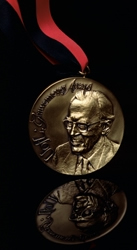GRAWEMEYER AWARD FOR IDEAS IMPROVING WORLD ORDER
2001 - Janine Wedel "Collision and Collusion: The Strange Case of Western Aid to Eastern Europe 1989-1998"
Nov. 30, 2000
 A book analyzing the dangers of ill-planned, poorly executed and misdirected foreign aid has won the 2001 University of Louisville Grawemeyer Award for Ideas Improving World Order.
A book analyzing the dangers of ill-planned, poorly executed and misdirected foreign aid has won the 2001 University of Louisville Grawemeyer Award for Ideas Improving World Order.
Janine Wedel, an anthropologist affiliated with the University of Pittsburgh's Graduate School of Public and International Affairs who has studied the evolving economic and social order in Eastern Europe for 20 years, will receive a $200,000 cash prize for the ideas set forth in her book, "Collision and Collusion: The Strange Case of Western Aid to Eastern Europe 1989-1998."
A raft of fly-in, fly-out consultants and reforms financed by Western taxpayers did little to help Russia and other former Soviet bloc nations build themselves as democratic, free-market states, Wedel says in her 1998 book. The American government helped wreak economic and social disaster in Russia by providing inappropriate policy advice and aid to corrupt power brokers.
In September, the U.S. Department of Justice sued Harvard University and two of its scholars who were under federal contract to provide economic and legal advice on Russian privatization during the aid process. The lawsuit accuses the scholars of profiting from that enterprise.
"This is a book that is bound to have a long-term impact on the practice and politics of foreign aid from the West to non-western economies," said the Grawemeyer selection committee.
Wedel's work was chosen for the award from among 51 nominations submitted this year by individuals and organizations throughout the world.
About the winner
An anthropologist at the University of Pittsburgh, Janine Wedel has studied Eastern Europe's evolving economic and social order for two decades, conducting eight years of fieldwork in the region.
Besides her current posts as associate professor at the Graduate School of Public and International Affairs and director of research development at Pittsburgh's Ridgway Center, Wedel is serving as a fellow at the National Institute of Justice in Washington D.C.
A three-time Fulbright fellow, she has received awards from the National Science Foundation, the MacArthur Foundation, the Woodrow Wilson International Center for Scholars, the United States Institute of Peace and the National Council for Eurasian and East European Research.
As a policy-analyst anthropologist, Wedel has testified before congressional committees and frequently participates in National Research Council and National Academy of Sciences workshops. She is a member of the U.S.-Ukrainian Working Group on Organized Crime.
She has served as associate producer of three PBS documentaries on Eastern Europe and has contributed articles and opinion pieces to more than a dozen major news outlets, such as The New York Times, Los Angeles Times and Christian Science Monitor.
News coverage of her work has appeared on CNN and National Public Radio and in a host of publications, including the Wall Street Journal, Newsweek, Washington Post, Chronicle of Higher Education, Nation, New Republic, The New York Times Magazine, Investor's Business Daily, Vanity Fair, Moscow Times and Pravda.
Wedel earned a Ph.D. in anthropology from University of California-Berkeley in 1985, a master's degree in anthropology from Indiana University in 1981 and a bachelor's degree in history and the social sciences and German from Bethel College in North Newton, Kan., in 1978.
In addition to her Grawemeyer Award-winning book, "Collision and Collusion: The Strange Case of Western Aid to Eastern Europe 1989-1989" (St. Martin's Press, 1998), Wedel wrote "The Unplanned Society: Poland During and After Communism" (Columbia University Press, 1992) and "The Private Poland: An Anthropologist Looks at Everyday Life" (Facts on File, 1986).
On line at Grawemeyer Award Winners.


